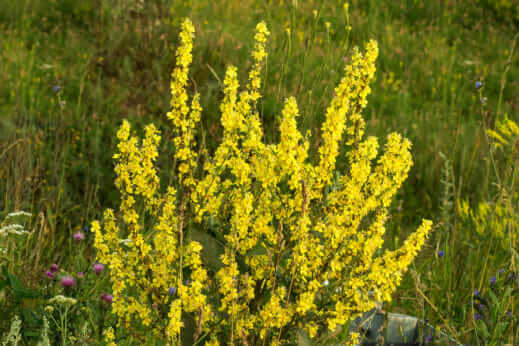
Posted on 06/21/2019 6:38:04 AM PDT by Red Badger
Don't worry, it's totally legal.
Quite a few plants may be safely, and pleasurable, lit up in a pipe or rolling papers. Those listed below are legal, unregulated, and totally safe to use. They are also non-hallucinogenic and non-addictive – perhaps that explains their lack of popularity?
While they won’t get you high, when blended according to the instructions below, these herbs produce a smooth, tasty smoke and give a gentle, relaxing buzz. All of the following varieties may be purchased online or at any well-stocked herb store. You may also grow your own. Of course, we’d be remiss not to remind you to discuss any questions with a doctor.
While scores of herbs are smokable, those listed below are among the most commonly used and easily grown at home. Skip to the sidebar to learn how to dry your herbs into the perfect smoking blend.
Mullein (Verbascum thapsus)

By 13Smile / shutterstock.com
=========================================================
Herbal Properties: Mullein has a long history of use as a lung tonic. It can actually help you stop coughing when you’re sick.
Smoking Qualities: The smoke is extremely light and mild, almost like smoking air, and virtually flavorless.
Type of Plant: This biennial herb grows up to two feet wide at the base, with flower stalks rising six feet or more.
How to Grow: Considered by some a garden weed, this fuzzy-leafed plant is very easy to grow from seed planted directly in the garden in spring. It prefers a sunny location and soil that is well-drained and not too fertile. It benefits from a bit of irrigation as a seedling but is drought-tolerant once established.
Skullcap (Scutellaria spp.)
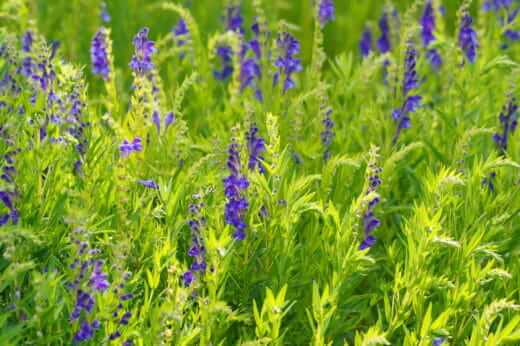
By Mariola Anna S / shutterstock.com
==========================================================
Herbal Properties: Skullcap has a mild calming effect when smoked.
Smoking Qualities: This herb is a medium smoke, with a fairly neutral flavor.
Type of Plant: A spreading perennial that grows about a foot tall, skullcap makes an attractive groundcover in the garden.
How to Grow: Sow seeds indoors in spring, planting the seedlings in a sunny or partly shaded location with rich soil once the weather has warmed. Skullcap requires weekly irrigation during dry periods. Cut the dried foliage to the ground each fall.
Coltsfoot (Tussilago farfara)
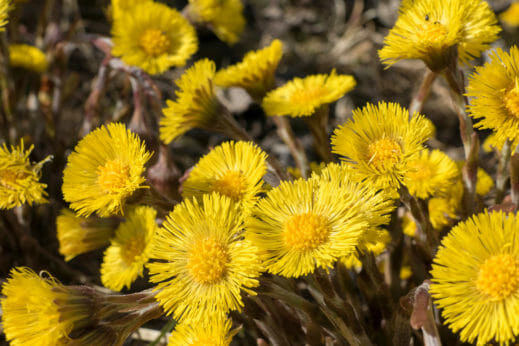
By footageclips / shutterstock.com
=========================================================
Herbal Properties: Coltsfoot is an expectorant, helping to free phlegm from the lungs.
Smoking Qualities: This herb is a light smoke with a neutral flavor, but can cause harsh coughing if used in a high concentration in smoking blends.
Type of Plant: This 6- to 12-inch tall groundcover spreads by underground rhizomes to form extensive colonies under optimum growing conditions.
How to Grow: Dried coltsfoot seed rarely germinates, but “fresh” seed, as well as potted plants, are available online. Rich, moist soil and a location in full sun or part shade are this plant’s preferred growing conditions.
Mugwort (Artemesia vulgaris)
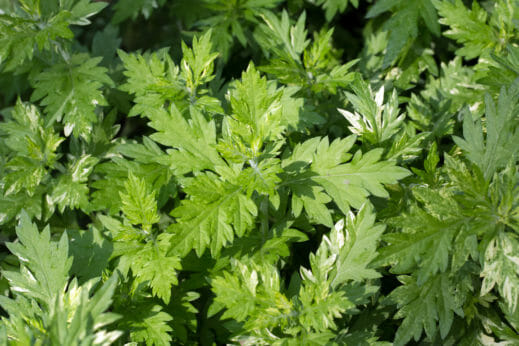
By Skyprayer2005 / shutterstock.com
===========================================================
Herbal Properties: Many ancient cultures smoked mugwort to promote vivid dreams. It also produces a very mild psychotropic effect while you’re awake.
Smoking Qualities: This herb is a light smoke with a pleasant, slightly sweet flavor.
Type of Plant: Mugwort is a spreading perennial growing up to 2 feet tall.
How to Grow: While seeds are available online, mugwort is easier to start from a potted plant, or by transplanting a clump from an established patch. Mugwort thrives with little care once established, but beware: it can become invasive, especially in moist locations. Cut the dried stalks to the ground each fall.
Uva-Ursi (Arctostaphylos uva-ursi)
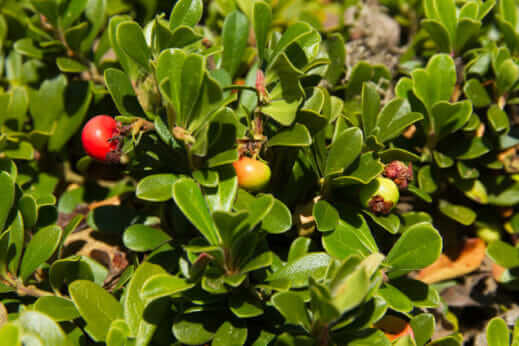
By Sigur / shutterstock.com
===========================================================
Herbal Properties: Also known by the Algonquin name kinnikinnick, this native plant has long been smoked by Native American tribes for ceremonial purposes.
Smoking Qualities: Uva-ursi herb is a medium smoke with a strong earthy flavor.
Type of Plant: This attractive woody groundcover, which grows about 6 inches tall, is a popular landscaping plant.
How to Grow: Uva-ursi is very difficult to propagate by seed, so it’s best to obtain potted specimens from a native plant nursery in your area, or from an online supplier. Grow in full sun or light shade; excellent drainage is essential. Uva-ursi is drought-tolerant and requires little care once established.
Mint (Mentha spp.)
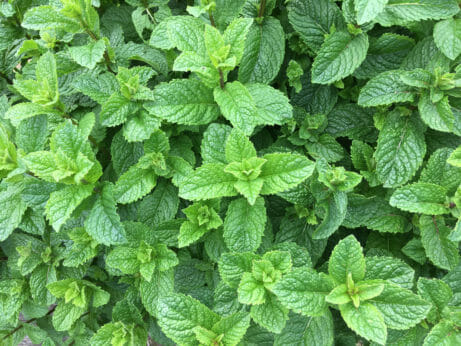
By Eag1eEyes / shutterstock.com
===========================================================
Herbal Properties: Mints are used primarily to impart flavor to smoking blends. There are many varieties worth experimenting with, including spearmint (Mentha spicata) (pictured above), peppermint (Mentha piperita), and chocolate mint (Mentha x piperita ‘Chocolate’). Close relatives of mint, including lemon balm (lemony flavor) and yerba buena (sweet menthol flavor), are often incorporated in smoking blends, as well.
Smoking Qualities: Varies by species.
Type of Plant: These herbaceous perennials spread to form extensive colonies under optimum growing conditions.
How to Grow: Mints are easier to establish from potted plants, or by transplanting a clump from an established patch, than by sowing seeds. Part sun and rich, moist soil are the preferred growing conditions. Mints can become invasive in the garden, especially in moist areas, so you may want to confine them to a pot. Cut the dried stalks to the ground each fall.
Sage (Salvia spp.)
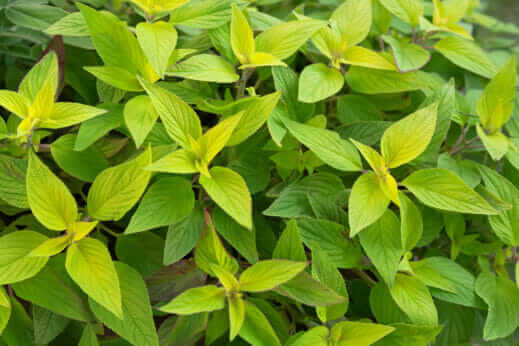
By sasimoto / shutterstock.com
==========================================================
How to Make Your Own Herbal Smoking Blend
Smoking mixtures are largely a matter of personal tastes and preferences – experiment with different herb combinations to see what suits you best – but here are the basics to get you started.
Harvest fresh, young leaves, ideally in the morning after the dew has evaporated. Dry the leaves slowly indoors – try hanging them in bundles from the ceiling or spreading them out on a window screen (see our article on drying techniques here). Don’t dry them fast in an oven, as you want the leaves to retain a bit of moisture for a smoother smoke. Once dry, crush the leaves by hand into an even consistency. Combine according to the guidelines below:
General Guidelines:
Mullein is the ideal “base” for smoking blends because it is such a light, smooth smoke. It should form about 50 percent of the mixture. Then add several other herbs for the “body” of the blend. Mugwort and skullcap create a headier smoke, while uva-ursi gives it more of a tobacco-like quality. Add a bit of coltsfoot if you’re lungs are irritated from frequent tobacco use. Combined, these herbs should constitute about 40 percent of the blend. Use flavoring herbs, like mints and sages, for the final 10 percent of the blend. If the blend is too harsh when you smoke it, trying spritzing the dried herbs with a spray bottle to reintroduce moisture. Store smoking blends in glass jars or resealable plastic pouches.
Herbal Properties: Sages are used primarily to impart flavor to smoking blends. There are many varieties worth experimenting with, including white sage (Salvia apiana), black sage (Salvia mellifera), and pineapple sage (Salvia elegans) (pictured above). Beware though: One type of sage, Salvia divinorum, has strong psychotropic properties and is illegal in many states (many gardeners find themselves accidentally breaking the law).
Smoking Qualities: Varies by species.
Type of Plant: Most sages are shrubby perennials, ranging from less than 1 foot to more than 6 feet tall.
How to Grow: Growing conditions vary by species, but most sages prefer full sun and dry conditions. Cut them back about 50 percent each fall.
I didn't know mulein was used for that. Sad.
There's the Velvet plant that has heart shaped leaves which is used for that purpose. Has the weirdest flower pods.
“Well... you learn something every day.
It looks like the mugwort plant is the one that is the weed giving me fits in my garden. I’ll have to check out the flowers against the plant description to see if that’s it, or its just a case of the leaves being similar.”
“By their fruits shall ye know them.”
~~~~~~~~~~~~~
You and me both. Does it have a long root, kind of like a parsnip? This thing is impossible to get rid off in my garden! Grrrr.....
It looks like a morning glory flower and was prevalent in our corn fields as a weed.
It grows in the very worst conditions around here. Road shoulders and railroad track beds.
Locoweed. I saw a plant in a pile of soil a guy brought into his yard, once. He had no clue.
Ironically, smoking mullein has pretty much put a stop to my asthma problems. I suppose it might cause lung cancer down the road, but I’ve got enough medical issues that I’m not likely going to have a long lfiespan anyhow (I have five or six different autoimmune disorders), so I might as well be comfortable during whatever time I’ve got left.
So, no munchies?
To me it smells like the Thanksgiving turkey is burning in the oven.........
Every year I pick a new area in my lawn where I don’t mow for the summer just to see what may pop up. It’s amazing what shows up.
I saw this plant growing on my property one year and saved the seeds because it was a nice plant. I intended to look up what it was but never did. Thanks for the info that it’s Rabbit Tobacco. I’ll make sure to give it a designated spot in my garden and out of the weed department.
Eating is the last thing you want to do.
I saw two guys who had drank jimson weed tea once.
They were in agony.............
As a bit of perspective I grew-up in Pittsburgh where environmentalists decided to put 80,000 men out of work rather than have us continue to breathe in smoke that was at 1/100000000 the level you’d get from smoking any of this stuff.
New studies have linked air polution expecially particle size PM2.5 to diabetes. There is a very strong correlation between areas of high PM2.5 polution and diabetes.
So I looked briefly to find out if cigaratte smoke is PM2.5. While I didn’t find that, I did find that smokers have a 40% greater risk of developing diabetes.
So put that in your pipe and smoke it and wonder why your toes are being cut off.
If nothing else those pics help me identify what’s growing where I’m at thanks
I rarely spot mullein in Texas, or Maine which are the states where I soend most of my time. However, I see it all over the place driving from Texas to Maine or vice versa... so I usually collect it on the way. It’s not ideal to collect any plant from along a highway, however, because tire rubber breaks down into dust, that contains heavy metals that collects along roadsides. The metal is added to raise the melting temperature of the rubber. Apparently tires get up to about 200 degrees at hihway speeds and would not last long without metal additives.
I loved Djarums!
“Manson Family” members, in addition to lots of L.S.D. used Jimson Weed extensively. Nasty, nasty stuff.
I heard a Sunday gardening program a couple weeks ago talking about it as a landscape plant, the host casually mentioned over the air “I think you can smoke it and get a buzz” couldn’t believe she said that. Any 12 year old kid will hear that and try it.
It grows wild in our hay fields and starts to dry around the last hay cutting. It’s supposed to be dry when you pick it, like in the second picture. It seems to grow most places. I’m in S.E. Tennessee and it’s all over the place. It’s beautiful when it’s green.
I was born with Dain Bramage. Only hippies need the weed to achieve such greatness.
Cook at 350...it shouldn’t burn. :)
The THC itself is scheduled as a controlled substance, so it still wouldn’t be legal.
There are other cannabinoid compounds that aren’t scheduled, in fact, our bodies naturally produce some of them. I don’t think they’ll get you that high though.
Disclaimer: Opinions posted on Free Republic are those of the individual posters and do not necessarily represent the opinion of Free Republic or its management. All materials posted herein are protected by copyright law and the exemption for fair use of copyrighted works.